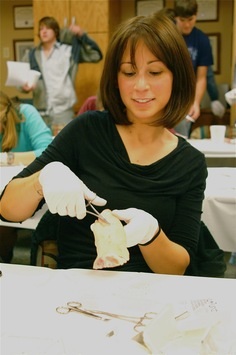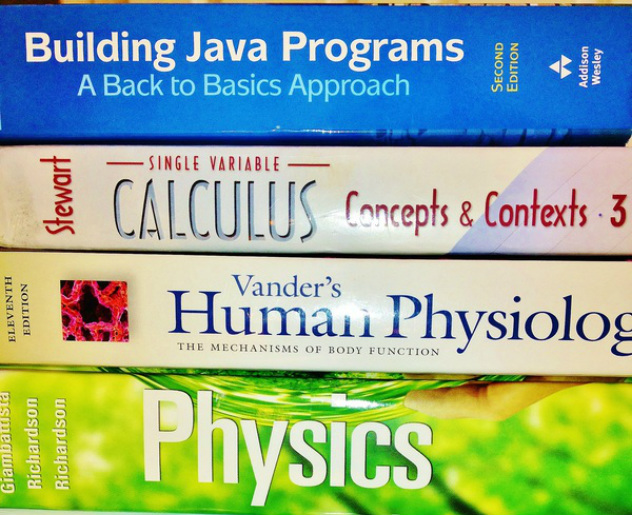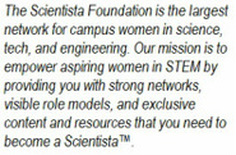|
By Julia Tartaglia Scheduling classes for next semester? Here are Four Scheduling Pitfalls every Scientista should avoid! #1) Taking all science classes You love science, so what could be more perfect than two fun science electives to counterbalance that intro to engineering and second semester calculus, right? WRONG. We’ve all heard the tale of that overeager freshman who thinks she can do it all, and we admire the ambition! But before you convince your hesitant advisors that four labs, twelve hours of lecture, eight midterms, and four finals-- not to mention the possible weekly problem sets and research reports-- will be a walk in the park, we ask you to reconsider. We have found that the happiest and the most successful science students are those who spread out their science requirements over the course of four years. Science courses are some of the most demanding, and they often have more requirements than others, such as that extra lab. We recommend taking no more than two intensive science courses per semester. Try scheduling in a general education requirement and a fun elective (acting for beginners, anyone?). You’ll find that you will get a lot more out of your science classes when you have time to digest the material without feeling overwhelmed. Of course, taking all science classes may be unavoidable (say, you are going abroad or switched to engineering as a Junior). If this is the case, talk to your advisor about how you might best set up your schedule so that you don’t burn out too fast.  #2) Not comparing exam schedules My freshman spring, I made the mistake of not checking the exam schedule before taking four classes with final exams. Turns out, I had four finals within 24 hours. By the time my last exam rolled around, I was exhausted hours of back-to-back testing, I was exhausted for my last exam. Learn from my mistake – if your school provides you with exam schedules (midterms/ papers/ finals) in advance, do take a look and see if your assignments and exams overlap. The same goes for workload and extracurricular activities. Are you going to have five nights of dance performances in February? Thesis due in April? Try to choose classes that have a spread out workload so that you don’t find yourself swamped. Sometimes professors will offer extensions for thesis writers, which is a great opportunity you should ask about and take advantage of!  #3) Lab, lab, and lab… For the underclassmen: As a Scientista, you may be eager to get into a lab, and get there fast. While being excited about research and exploring lab opportunities early is great, keep in mind that independent research can be quite a large time commitment. So are those introductory science courses, which are often large lectures, with many assignments, and of course, labs! Many advisors recommend not pairing a lab-heavy academic schedule with an intense research schedule. Both take up a lot of time, and you may find yourself in a scheduling tiff. Freshmen and sophomores - don’t feel pressured to jump right into research. There will be plenty of opportunities for you to get involved over summers and in your junior and senior year. This doesn’t mean you can’t do research if you really want to, or if you know you have the time for it! Many freshmen and sophomores do become research assistants and make it work. But for those taking courses with labs, do keep in mind that you may want to hold off on the research for a bit, or find a lab that might not be as time-consuming right away. For the thesis writers: It’s your senior spring! It’s also crunch time for writing your theses. Though you are likely done with data collection, you may find yourself with an extremely busy lab schedule. Data analysis can require hours a week with your PI or post docs. The actual writing process can be time consuming. This means you’re going to want to keep your schedules lighter (especially if you want to enjoy your last semester!). We recommend only taking three classes if you can. Try out some fun, refreshing electives that you didn’t get a chance to take during your four years!  #4) Skipping the pre-reqs That upper level Pharmacology and Human Diseases class is the reason you chose your major, and you want to take it now. So who cares if it requires two department intros? If you study really hard, you’ll be fine…right? Again, before you go skipping your intro classes, we advise you to consider carefully. Advanced classes are filled with experienced students who have been immersed in college for some time now. They know how to study for exams and know what is expected of them. They may have even covered some of the material in earlier classes. We know you’re smart, but though you may be capable of understanding the material, you will be at a disadvantage. Furthermore, by skipping intro classes, you miss out on valuable fundamental information that you could be learning in the more basic classes. We advise that you only skip intro classes if your school has a placement policy (such as advanced standing for AP credit). If your school allows you to shop classes or add/drop, try sitting in for a while before you commit. You’ll get a feel for whether or not you’d be in over your head. And again, if you’re a freshman or sophomore, don’t feel like you’re missing out – you will have time to take advanced classes as a junior and senior, and you will be well prepared for them! Now you're ready! Armed with this information, you are now ready to make those spring schedules! For more advice on succeeding in your courses, check out our blog post, 9 Tips for Acing your Science Class! Do you have more scheduling advice or stories? Share them with us by commenting below. Happy course shopping! ~XX About the Blogger
Comments? Leave them below!
0 Comments
Your comment will be posted after it is approved.
Leave a Reply. |
Education BlogAbout ScientistaSubscribe!NEW!New PostsWhat's HotClick to set custom HTML
You Might Like...
Connect With UsLatest tweets |
The Scientista Foundation, Inc. All Rights Reserved © 2011-2021 | Based in NY | [email protected]
The Network for Pre-Professional Women in Science and Engineering
The Scientista Foundation is a registered 501(c)(3) -- Donate!
The Network for Pre-Professional Women in Science and Engineering
The Scientista Foundation is a registered 501(c)(3) -- Donate!




 RSS Feed
RSS Feed









